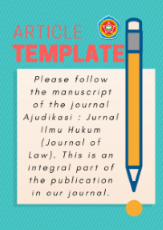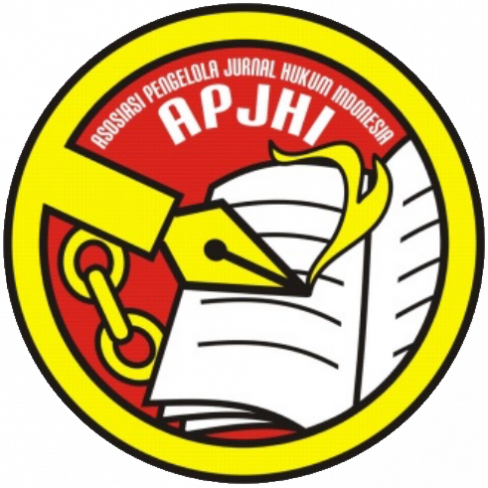Penggunaan Akun Bot Media Sosial untuk Mempengaruhi Opini Publik : Sebuah Tinjauan Hukum Di Indonesia
 Abstrak views: 702
,
Abstrak views: 702
,
 PDF BAHASA INDONESIA (English) downloads: 657
PDF BAHASA INDONESIA (English) downloads: 657
Abstrak
Today’s political discourse can’t be disattached from the usage of social media. There are plenty of political actors using it to campaign their issues and attack their political rival in order to influence public opinion. One of the instruments used by the political actor in using the social media is bot accounts. Bot accounts are an automated online account where all or substantially all of the actions or posts of that account are not the result of a person. The usage of bot accounts are viewed as harmful for democracy by many experts on law and democracy. However, a lot of states have no regulation regarding the usage of bot accounts, including Indonesia. This article is intended to bring legal review on the usage of bot accounts to influence public opinion in Indonesia. Using deliberative democratic theory, this article views that the usage of bot accounts could prevent the objective achievement of democracy based on UUD 1945. The authors recommend the regulation of bot accounts through the revision of UU No. 19 Tahun 2019 about Informasi dan Transaksi Elektronik with bringing up various important argumentations regarding the law implementation.
Keywords : Bot Accounts; Social Media; Public Opinion; Democracy; Legal Review.
Downloads
Referensi
a) Buku dan Bab dalam Buku
Dahl, Robert. Democracy and Its Critics. New Haven: Yale University Press, 1991. https://doi.org/10.7312/grau91070-013.
Fishkin, James S. “Deliberative Democracy in Context: Reflections on Theory and Practice.” In Deliberative Mini-Publics: Involving Citizens in the Democratic Process, edited by Kimmo Grönlund, Andre Bächtiger, and Maija Setälä. ECPR Studies, 2014.
Hage, Jaap. “The Method of A Truly Normative Legal Science.” In Methodologies of Legal Research, edited by Mark Van Hoecke, 1st ed., 19–44. Oxford: Hart Publishing, 2011. https://doi.org/10.5040/9781472560896.ch-005.
Karlsson, Christer. “Den Deliberativa Drömmen Och Politisk Praktik – Samtalsdemokrati Eller Elitdiskussion.” In Demokratins Mekanismer, edited by Mikael Giljam and Jörgen Hermansson. Malmo: Liber, 2003.
b) Artikel Jurnal
Ferrara, Emilio, Onur Varol, Clayton Davis, Filippo Menczer, and Alessandro Flammini. “The Rise of Social Bots.” Communications of the ACM 59, no. 7 (2016): 96–104. https://doi.org/10.1145/2818717.
Firmansyah, Mas Agus, Deddy Mulyana, Siti Karlinah, and Suwandi Sumartias. “Kontestasi Pesan Politik Dalam Kampanye Pilpres 2014 Di Twitter : Dari Kultwit Hingga Twitwar.” Jurnal Ilmu Komunikasi 16, no. 1 (2018): 42–53. http://jurnal.upnyk.ac.id/index.php/komunikasi/article/download/2681/2246.
Haliim, Wimmy. “Demokrasi Deliberatif Indonesia : Konsep Partisipasi Masyarakat Dalam Membentuk Demokrasi Dan Hukum Yang Responsif.” Jurnal Masyarakat Indonesia 42, no. 1 (2016): 19–30. http://jmi.ipsk.lipi.go.id/index.php/jmiipsk/article/download/556/457.
Lee, Katrina. “Your Honor, on Social Media: The Judicial Ethics of Bots and Bubbles.” Nevada Law Journal 19, no. 3 (2019): 789–822. https://scholars.law.unlv.edu/cgi/viewcontent.cgi?article=1794&context=nlj.
Syahputra, Iswandi. “Demokrasi Virtual Dan Perang Siber Di Media Sosial: Perspektif Netizen Indonesia.” Jurnal ASPIKOM 3, no. 3 (2017): 457. https://doi.org/10.24329/aspikom.v3i3.141.
c) Laporan
Ansari, Chairul, Subhan Hadil, Karet Susetyo, Agus Triyanto, Bambang Pujicahyono, Fadhiya Djunaidy, Ike Kusumaningtyas, and Yonda Nurtaqwa. “Penetrasi & Perilaku Pengguna Internet Indonesia.” Jakarta Pusat, 2016.
Athallah, Raffa A. “Memanipulasi Publik Lewat Akun Bot Twitter.” Remotivi, 2019.
Bradshaw, Samantha, and Philip N Howard. “The Global Disinformation Order: 2019 Global Inventory of Organised Social Media Manipulation.” Oxfor, 2019.
Dahl, Robert. Democracy and Its Critics. New Haven: Yale University Press, 1991. https://doi.org/10.7312/grau91070-013.
Fahmi, Ismail. “Perang Robot Kubu 01 vs 02_ #VisiMisiJokowiMenang vs #HaramPilihPemimpinIngkarJanji.” Drone Emprit, 2019.
Ferrara, Emilio, Onur Varol, Clayton Davis, Filippo Menczer, and Alessandro Flammini. “The Rise of Social Bots.” Communications of the ACM 59, no. 7 (2016): 96–104. https://doi.org/10.1145/2818717.
Firmansyah, Mas Agus, Deddy Mulyana, Siti Karlinah, and Suwandi Sumartias. “Kontestasi Pesan Politik Dalam Kampanye Pilpres 2014 Di Twitter : Dari Kultwit Hingga Twitwar.” Jurnal Ilmu Komunikasi 16, no. 1 (2018): 42–53.
Fishkin, James S. “Deliberative Democracy in Context: Reflections on Theory and Practice.” In Deliberative Mini-Publics: Involving Citizens in the Democratic Process, edited by Kimmo Grönlund, Andre Bächtiger, and Maija Setälä. ECPR Studies, 2014.
Fuqoha, Fuqoha, Ananda Putri Anggraini, and Nabila Dea Apipah. “Peningkatan Digital Literasi Terhadap Ujaran Kebencian Di Media Sosial Melalui Program ‘Room of Law’ Bagi Siswa Sekolah Menengah Atas Di Kota Serang.” Bantenese Jurnal Pengabdian Masyarakat 1, no. 1 (2019): 9–17. http://e-jurnal.lppmunsera.org/index.php/PS2PM/article/view/1050.
Hage, Jaap. “The Method of A Truly Normative Legal Science.” In Methodologies of Legal Research, edited by Mark Van Hoecke, 1st ed., 19–44. Oxford: Hart Publishing, 2011. https://doi.org/10.5040/9781472560896.ch-005.
Haliim, Wimmy. “Demokrasi Deliberatif Indonesia : Konsep Partisipasi Masyarakat Dalam Membentuk Demokrasi Dan Hukum Yang Responsif.” Jurnal Masyarakat Indonesia 42, no. 1 (2016): 19–30.
Hellden, Erik, and Johanna Gulliksen. “A New Threat to Democracy? Examining the Democratic Implications of the Social Bot Phenomen.” Lund University, 2017.
Indonesia, Republik. Undang-Undang Dasar 1945 (1945).
———. Undang-Undang Republik Indonesia Nomor 19 Tahun 2016 Tentang Perubahan Atas Undang-Undang Nomor 11 Tahun 2008 Tentang Informasi Dan Transaksi Elektronik (2016).
Karlsson, Christer. “Den Deliberativa Drömmen Och Politisk Praktik – Samtalsdemokrati Eller Elitdiskussion.” In Demokratins Mekanismer, edited by Mikael Giljam and Jörgen Hermansson. Malmo: Liber, 2003.
Lee, Katrina. “Your Honor, on Social Media: The Judicial Ethics of Bots and Bubbles.” Nevada Law Journal 19, no. 3 (2019): 789–822.
Madison, Samantha. “How Social Media Has Changed the Way Political Movements Organize.” Government technology, 2017.
Syahputra, Iswandi. “Demokrasi Virtual Dan Perang Siber Di Media Sosial: Perspektif Netizen Indonesia.” Jurnal ASPIKOM 3, no. 3 (2017): 457. https://doi.org/10.24329/aspikom.v3i3.141.
Tucker, Joshua A., Andrew Guess, Pablo Barberá, Christian Vaccari, Alexandra Siegel, Sergey Sanovich, Denis Stukal, and Brenden Nyhan. “Social Media, Political Polarization, and Political Disinformation.” William and Flora Hewlett Foundation, 2018. https://doi.org/10.2139/ssrn.3144139.
All articles in Ajudikasi : Jurnal Ilmu Hukum can be disseminated provided they include the identity of the article and the source of the article (Ajudikasi : Jurnal Ilmu Hukum). The publisher is not responsible for the contents of the article. The content of the article is the sole responsibility of the author
Ajudikasi : Jurnal Ilmu Hukum is lincensed under a Creative Commons Attribution-ShareAlike 4.0 International License.





1.png)
.png)
.png)




.png)
.png)
.png)
.png)





.png)







